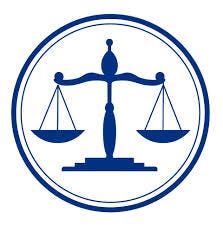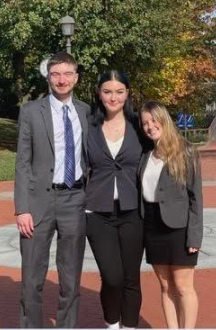
Hamilton’s Mock Trial team competed in their first competition this semester over the weekend starting Saturday, Oct. 23 on Zoom.
The University of Pennsylvania hosted the invitational, which consisted of four rounds with two rounds occurring each day.
Hamilton’s Mock Trial team competes under the American Mock Trial Association (AMTA). Every year, AMTA releases a fictional case packet. This includes a fictional defendant, fictional witnesses, as well as a fictional state and jurisdiction, which all impact the way the members object, speak and write statements. The case packet contains everything available to use as the members compete. The case changes each academic year, with this year’s being aggravated arson.
Mock Trial competed as two different teams, Hamilton A and Hamilton B. They went against different opponents every round. In each round, the goal is to win ballots. Every person on the team is scored (given points) in their role. This includes opening/closing statements, direct/cross-examinations and witness testimonies. In this tournament, teams who won the ballot in the first round would go against other teams who won their ballot in the second round and so on. The technical winner of a tournament is considered the team which won the most ballots overall. Hamilton Team A won 3 ballots, while Hamilton Team B won 5.
Elise Wilson ’22 commented on both of the teams’ performance: “This was the best performance I’ve ever seen Mock Trial give at the first tournament of the year. The first-years in particular were so well-prepared and unfazed, even though it was their first tournament.”
Although many upperclassmen experienced Zoom trials last semester, this was the first time for many new members, including for Bella Ocava ’25. The special format of an online competition changed the way the Mock Trial members can act. Ocava explained there are different “conventions,” such as asking permission to share one’s screen.
For the competition, Hamilton’s Mock Trial team booked classrooms in the Kirner-Johnson building for the weekend, providing ample space for attorneys, witnesses and the rest of the Mock Trial team to have their own rooms. This included a “viewing room” which was utilized by all the members not currently participating in the trial. The members were able to watch the trial happen over Zoom together, which afforded the team a chance to comment on the trial as it was happening. Ocava highlights this as one of the key differences between a trial over Zoom versus a trial in-person. “When you’re in a real courtroom there’s not a lot of verbal communication.”
Ocava explained how this first Zoom trial helped her prepare for what’s to come in future in-person tournaments: “The Zoom trial allowed us to be a bit more comfortable since we haven’t been thrust into a courtroom yet. It gave us time to be with the team and reflect on the trial as it was happening.” Brooke Kessler ’22, Co-Captain of the Mock Trial team, explained that it is harder to communicate with their counsel tables, but they put in a lot of practice to make it work.
The hard work is not over yet, as another tournament will take place on Nov. 6 and 7, at the University of Rochester. This tournament will be in-person in an actual courtroom, and will be the first time the younger members of Mock Trial compete in an in-person tournament, their first since Mar. 2020. Kessler explained that this year, Mock Trial took nine new members, which is their largest first-year class. The younger members have changed roles for this new tournament to see where their strengths best lie. The team will be hard at work this week in preparation.
Kessler and the team also celebrated the team’s increase in ranking, as they are now 89th in the country, 30 places up from last year.
Best of luck to Hamilton’s Mock Trial team this weekend, and congratulations on an amazing performance this past tournament. The members look forward to a successful season.



















